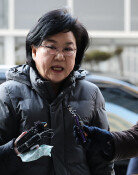No Biochemical Retaliation and Hussein`s Real Intentions
No Biochemical Retaliation and Hussein`s Real Intentions
Posted March. 23, 2003 22:25,
"Why does Hussein refrain from using biochemical weapons?"
As of yesterday, more than 100 hours have passed since the outbreak of the Iraq war. But the Iraqi forces show no sign of imminent use of biochemical weapons, contrary to the earlier warning that Hussein would use them right upon the start.
Originally, the Pentagon and U.S. media predicted that, once war broke out, the Iraqi regime would mobilize whatever means it could, including use of biochemical weapons, burning of oil wells, forceful use of human shields and attacks on Israel. This prediction contributed to justification of the war for the United States and Britain.
The United States warned prior to the war that anyone who uses biochemical weapons would be prosecuted as a war criminal. This warning might have worked.
Second, as argued by Hussein, Iraq might not have any weapons of that nature. The U.N. weapons inspection team had mobilized 200 experts to find out, to no avail, the weapons for 4 months from last November.
Most experts, however, believe that Hussein would spare the deadly weapons for the battle to be waged in Baghdad, where the winner and the loser of this war are to be determined.
Currently, seven of the 400 oil wells are to be set on fire. The Iraqi regime has vehemently denied its involvement in the burning. If it had been a work of arson, it is not comparable to the one the world experienced during Desert Storm, or the first Gulf War.
Since the outbreak, the Iraqi forces shot 10 missiles into Kuwait, all of which were the solid-fuel Ababil-100s, confirmed the Pentagon yesterday. In other words, Iraq has not used its high-tech guided Scud missiles. In this respect, the ongoing war is different from the previous Gulf War. In 1991, Iraq showered Israel with Scud missiles right upon the start.
For now, Iraq has designated some places for volunteer human shields. But, the move is not forceful in any respect. South Korean Bae Sang-hyun, who has volunteered for the "job," stayed in a power plant on the outskirts of Baghdad, and moved over to a bunker in a hotel in downtown Baghdad on March 20. He reportedly stays there now.
To obtain a visa to Iraq, a South Korean photographer faked himself up as voluntary human shield. His identity, however, was discovered on March 19. But the Iraqi authorities did not impose any sanctions and just told him to choose whether he would stay there as a human shield or leave upon acknowledgment of his status as a reporter. Thus, the reporter is now in Jordan.
Some experts believe that Iraq`s waiving of the various options indicates its waiting for a decisive moment and its intention of winning over the United States in terms of legitimacy by stressing its humanitarian resistance.
In fact, Iraqi leader Saddam Hussein ordered Saturday that coalition troops in Iraq be treated as prisoners of war pursuant to the Geneva Convention. His cabinet members, however, insisted that they be treated as mercenaries subject to execution at Iraq`s will.
With regard to the big issue of biochemical weapons, if President Hussein uses them, the United States will be justified more strongly than before. In case the coalition forces fail to find any, however, America will bleed heavily in terms of legitimacy.
Hussein might be remembered as a martyr who maintained his principles until his last moment. This is the scenario the Untied States fears more than the long resistance in Baghdad. If the scenario becomes a reality, the Bush administration will be pushed into the corner against the Islamic world by conducting the war on terrorism.
Ki-Tae Kwon kkt@donga.com




![반찬통 착색 고민 끝…‘두부용기’ 버리지 말고 이렇게 쓰세요 [알쓸톡]](https://dimg.donga.com/c/138/175/90/1/wps/NEWS/IMAGE/2026/01/09/133126593.3.png)

![“생수병, 버리지 말고 자르자”…주방 밀폐 용기 끝판왕 [알쓸톡]](https://dimg.donga.com/c/138/175/90/1/wps/NEWS/IMAGE/2026/01/06/133101939.3.png)
